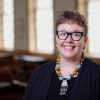On Thursday, March 26th, Heather and Molly attended the half-day online conference, Going Public: Opening Scholarship to All, hosted by the University of Washington. Although the primary audience was UW librarians and researchers, the conference was open to anyone who wished to participate.
Despite the shift to Zoom (which allowed us to participate, happily), the conference went well, running essentially as a multi-hour webinar with short breaks between sessions. Some speakers had slides, others did not, but all were engaging. Below are our respective highlights.
Heather
- Keynote speaker Nikkita Oliver touched on the issues of inequity that libraries can address and influence, arguing that scholarship is best when open to all.
- Negeen Aghassibake’s talk drew together intersecting domains of research, data visualization, and issues of defining race and ethnicity. She argues that the nuances of identity are commonly lost in traditional research methods, and that an engaged and participatory research agenda is critical for upending this harmful categorical erasure.
- Lauren Ray’s discussion of the impacts of open pedagogy and OER argues that, as we’ve often encountered in efforts to reimagine teaching practices, students should be centered as creators of information and not just consumers. Open pedagogy goes a long way toward encouraging use, reuse, and remixing not only of educational products but of the processes of learning. How might teachers shift from closed to open assignments, and from commercial to open resources that build on community strengths?
Molly
- Libraries are the liminal space between relic and living archive
- Building relationships before project ideas arise leads to more successful outcomes
- Data collection creeps in in ways we don’t always realize: surveys, web analytics, learning analytics, interviews, chat reference, focus groups, texts/narratives, geospatial info, patient records
- When cultures are not represented in data, their contributions are erased
- Noted as “not statistically significant” or lumped together with other races/ethnicities
- Simplifying data makes examining intersections of identity difficult
- Customize datasets to gather more nuanced information
- Data must follow the 5Rs of open: revise, retain, remix, reuse, and redistribute
- OER allows educators to create, remix, and modify materials for cultural context and localized knowledge
- Students see themselves reflected in and engaged in creating knowledge in OERs
